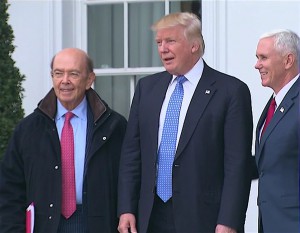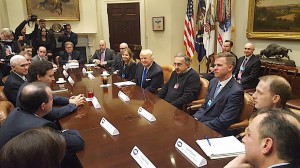Despite continued promises to bring back automotive manufacturing jobs to the U.S. through a renegotiation of the North American Free Trade Agreement, the Trump Administration’s efforts are likely to harm to the auto industry.
The NAFTA talks are nearly set to begin and a few of the major sticking points outlined by U.S. negotiators have auto industry officials wringing their hands over the anticipated negative impact they’ll have.
In attempt to increase the number of auto jobs, U.S. Trade Representative Robert Lighthizer wants to strengthen the rules of origin to block more parts from Asia as well as set a U.S.-specific content requirement for vehicles coming into the U.S. from Mexico.
One of Lighthizer’s stated objectives for NAFTA is to seek to “ensure the rules of origin incentivize the sourcing of goods and materials from the United States and North America.” Industry executives are concerned this will translate to a minimum percentage guarantee above the current 62.5%, which is the highest of any global trade bloc, according to Reuters.
(Manufacturers group blasts Trump on trade policies. For the story, Click Here.)
Surpassing the current level would raise costs and throw the supply chain into chaos, further exacerbating problems. Mexico has already stated its objection to any changes in the rules of origin, which makes this an even bigger problem beyond the opposition of automakers.

Commerce Secretary Wilbur Ross, left, wants significant changes to NAFTA that could add billions to automakers expenditures.
“Our members feel very strongly that rules of origin are not the tools to use to reshore jobs into the U.S.,” said Ann Wilson, senior vice president of government affairs for the Motor and Equipment Manufacturers Association, a trade group representing auto parts makers, told Reuters.
However, equally impactful is the push to limit parts from Asia. Much of the high-volume, much-desired technology in today’s vehicles relies on components that are very inexpensively made in Asian countries, such as the touch screens that are commonplace in cars, trucks and utes today.
These “tracing list” parts would ultimately count toward the 62.5% and U.S. Commerce Secretary Wilbur Ross is pushing for that to happen. The 300-page list hasn’t been updated in almost two decades, which has allowed for these Chinese-built components to find their way into vehicles coming into the U.S. tariff-free.
(Click Here for the details about the opening of NAFTA renegotiations.)
If Ross gets his way, it will be almost impossible for U.S. automakers to fall into compliance with minimum percentage requirement. If that happens, carmarkers will likely just pay the duty on the parts, according to said Charles Uthus, vice president for international policy at the American Automotive Policy Council, a lobbying group for Ford Motor Co., General Motors and Fiat Chrysler.
If Trump decides to exit the agreement, as he’s threatened to do on occasion, automaker costs would exploded by $4 billion-$5 billion a year, Ulthus told Reuters. Ford alone plans to spend about $7 billion this year.
Changes in NAFTA rules would weaken the ability of U.S. motor vehicle companies to compete globally, says Boston Consulting Group, which conducted a study about the impact of potential NAFTA changes. About half of all imported parts that U.S. OEMs procure for vehicle production come from low-cost countries and nearly 50% of these components are from Mexico.
(No change to NAFTA rule of origin Mexico officials say. Click Here for the story.)
An increase in NAFTA’s tariffs or rules of origin could drive up costs per vehicle substantially. And it would place the U.S. motor vehicle companies at a disadvantage against, for instance, German automakers, which import about the same percentage of components from low-cost countries as their U.S. counterparts do now.

